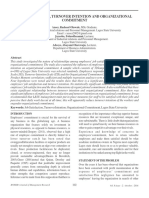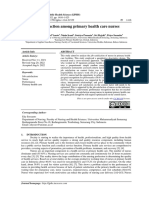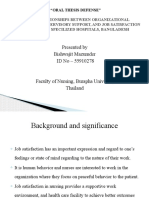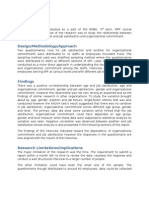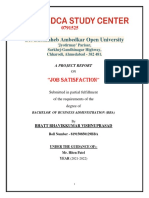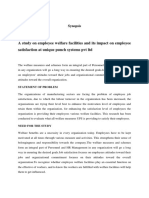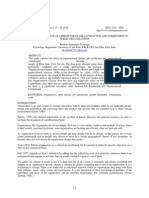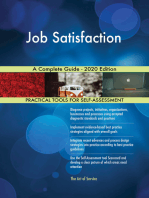Job Satisfaction Among Nurses of Private Hospitals
Job Satisfaction Among Nurses of Private Hospitals
Uploaded by
IAEME PublicationCopyright:
Available Formats
Job Satisfaction Among Nurses of Private Hospitals
Job Satisfaction Among Nurses of Private Hospitals
Uploaded by
IAEME PublicationCopyright
Available Formats
Share this document
Did you find this document useful?
Is this content inappropriate?
Copyright:
Available Formats
Job Satisfaction Among Nurses of Private Hospitals
Job Satisfaction Among Nurses of Private Hospitals
Uploaded by
IAEME PublicationCopyright:
Available Formats
International Journal of Management (IJM), OF ISSN MANAGEMENT 0976 6502(Print), ISSN (IJM 0976 ) INTERNATIONAL JOURNAL 6510(Online), Volume
me 4, Issue 2, March- April (2013)
ISSN 0976-6502 (Print) ISSN 0976-6510 (Online) Volume 4, Issue 2, March- April (2013), pp. 176-179 IAEME: www.iaeme.com/ijm.asp Journal Impact Factor (2013): 6.9071 (Calculated by GISI) www.jifactor.com
IJM
IAEME
JOB SATISFACTION AMONG NURSES OF PRIVATE HOSPITALS IN KERALA
Sathyajith S Lecturer, Department of Management Studies, Vedavyasa Institute of Technology, Calicut, Kerala Dr. R. Haridas Assistant Professor and Head, Department of Business Administration, Govt. Arts College for Men, Krishnagiri, Tamil Nadu
ABSTRACT In the time of socio-economic stigma and reproachful protest; it is studied to understand the level of satisfaction among nurses of private hospitals in Kerala. The study has operationalised through the collection of data by using questionnaire of 81 questions from 200 samples and analysis of data by applying Mean, Standard Deviation and Chi-square test. Key words: Job satisfaction, Nurses, Private hospitals INTRODUCTION Job satisfaction is the function of perceived relationship between what one wants from ones job and what he/she gets there from (Locke, E. A., 1969). It is a positive feeling about ones job resulting from evaluation of its characteristics (Robbins, S. P. et al., 2012). Job satisfaction is an essential part of ensuring high-quality care. Dissatisfied not only give poor quality, less efficient care (Grol, R. et al., 1995). Nurses who were not satisfied at work were also found to distance themselves from their patients and their nursing chores (Demerouti, E. et. al., 2000). Nowadays nurses are facing a socio-economic stigma in their job and working conditions especially in private sector. They are raising voice and that echoes all over the state and various parts of the country. In this context, job satisfaction among nurses of private hospitals in Kerala is studied with an objective to understand the level of satisfaction.
176
International Journal of Management (IJM), ISSN 0976 6502(Print), ISSN 0976 6510(Online), Volume 4, Issue 2, March- April (2013) METHODOLOGY Research on job satisfaction has tried to use Factor Analysis. Different factor analytical studies combine different factors with job satisfaction. Fung-Kam, L. (1998) considered salary and benefit, professionalism and autonomy. Patient care, environment, workload, co-workers, salary and benefits, professionalism, cultural background and career stage were considered by McNeese-Smith, D. K. (1999). Moyle, W. et al., (2003) used workplace flexibility, residents, working in a team, dedication to service, training, role expectations, laborious tasks, staffing levels and overtime for the study. Chu, C. I. et al (2003) combined co-workers, role expectations, activity, supervisor, routinization and resources. Work load, co-workers, supervisor, routinization and management were considered by Seo, Y. Ko, J. & Price, J. L. (2004). Major dependent variables of this study are job, management, personal adjustment and social relations. The measurement has operationalised with a questionnaire of 81 questions prepared in the light of SatisfactionDissatisfaction inventory developed by Pestonjee D. M. (1973). The sample size has been decided as 200 nurses and Simple random sampling has used to select them from the nurses of private hospitals in Kerala. The major independent variables of the study are age, sex and experience. The hypotheses set for the study are: H01: There is no significant relationship between job satisfaction and age H02: There is no significant relationship between job satisfaction and sex H03: There is no significant relationship between job satisfaction and experience For the analysis of the study, Mean, Standard Deviation, Chi-square test etc are used. RESULT AND DISCUSSION Among 200 respondents, 150 (75%) fall in the age limit of below 25, 44 (22%) in 26 to 35 and 6 (3%) in 36 to 45 age limit. Table 1 Age distribution of respondents Age Below 25 26- 35 36- 45 46- 55 56 and above Total F 150 44 6 0 0 200 % 75 22 3 0 0 100
Among the respondents, 66 (33%) are male and the rest, 134 (67%) are female.
177
International Journal of Management (IJM), ISSN 0976 6502(Print), ISSN 0976 6510(Online), Volume 4, Issue 2, March- April (2013) Table 2 Sex distribution of respondents Sex Male Female Total F 66 134 200 % 33 67 100
While taking experience, 172 (86%) are falling in the limit of below 5 years, 16 (8%) in 6 to 10 limit, 10 (5%) in 11 to 15, 2 (1%) in 16 to 20 years limit. Table 3 Experience of respondents Experience Below 5 years 6- 10 11- 15 16- 20 21 and above Total F 172 16 10 2 0 200 % 86 8 5 1 0 100
Table 4 shows the overall level of job satisfaction of the respondents. 30 (15%) are highly satisfied on their job, 144 (72%) are moderately satisfied and 26 (13%) shows low level of satisfaction. Table 4 Overall level of job satisfaction Level of job satisfaction High Moderate Low Total F 30 144 26 200 % 15 72 13 100
Chi square test has used to test hypotheses. Table 5 shows results of testing of hypotheses. Table 5 Result of test of hypotheses Relationship Job satisfaction and age Job satisfaction and sex Job satisfaction and experience 2 Value 16.54 12.15 39.86 P Value 0.0353 0.0023 0.0001 at 5% level of significance
While analysing, the hypotheses set for the study are rejected. That is, age, sex and experience are significantly related with job satisfaction.
178
International Journal of Management (IJM), ISSN 0976 6502(Print), ISSN 0976 6510(Online), Volume 4, Issue 2, March- April (2013) CONCLUSION It is found from the study, the majority of the nurses working in private hospitals are moderately satisfied in their jobs and the independent variables, age, sex and experience have significant relationship with job satisfaction. Being job satisfaction of nurses has direct relation with quality of health care, it become imperative to identify and address those factors which are stumbling blocks to job satisfaction by the policy makers, administrators and managers. REFERENCES 1. Chu, C. I., Hus, H. M. Price, J. L. & Lee, J. Y. (2003). Job satisfaction of hospital nurses: An empirical test of a causal model in Taiwan. International Nursing Review, 50, 176182. 2. Demerouti, E., Bekker, A., Nachreiner, F., Schaufeli, W. (2000), A model of burnout and life satisfaction amongst nurses, Journal of Advanced Nursing, 32 (2), pp. 454-464. 3. Fung-kam, L. (1998). Job satisfaction and autonomy of Hong Kong registered nurses, Journal of Advanced Nursing, 27 (2). 4. Grol, R., Lawrence, M. (1995), Quality Improvement by Peer Review, Oxford University Press, London. 5. Locke, E. A. (1969), Job satisfaction and job performance: a theoretical analysis, Organizational Behavior and Human Performance, 4, pp. 309-336. 6. McNeese-Smith, D. K. (1999). A content analysis of staff nurse descriptions of job satisfaction and dissatisfaction. Journal of Advanced Nursing, 29 (6). 7. Moyle, W, Skinner, J, Rowe, G. & Gork, C. (2003). Views of job satisfaction and dissatisfaction in Australian long-term care. Journal of Clinical Nursing, 12 (2). 8. Pestonjee D. M. (1973). Organisational Structure and Job Attitudes, Minerva Associates, Calcutta. 9. Robbins, S. P., Judge, T. A., Vohra, N. (2012), Organizational Behavior, Pearson Education, New Delhi. 10. Seo, Y, Ko, J. & Price, J. L. (2004). The determinants of job satisfaction among hospital nurses: A model estimation in Korea. International Journal of Nursing Studies, 41 (4), 437-447. 11. Karthikeyan and Dr.Dinesh.K.Srivastava, The Relationship between Core Self Evaluations, Individual Level Job Performance and Its Components, International Journal of Management (IJM), Volume 3, Issue 2, 2012, pp. 319-334, ISSN Print: 09766502, ISSN Online: 0976-6510. 12. Dr. C. Swarnalatha and Mr. G. SureshKrishna, Job Satisfaction and Work Locus of Control: An Empirical Study among Employees of Automotive Industries in India, International Journal of Management (IJM), Volume 3, Issue 3 2012, pp. 92-99, ISSN Print: 0976-6502, ISSN Online: 0976-6510.
179
You might also like
- J Nursing Management - 2018 - Pishgooie - Correlation Between Nursing Managers Leadership Styles and Nurses Job StressDocument8 pagesJ Nursing Management - 2018 - Pishgooie - Correlation Between Nursing Managers Leadership Styles and Nurses Job StressMona YahyaNo ratings yet
- A Database For Car Rental Software SystemDocument61 pagesA Database For Car Rental Software Systemnikwplay69% (16)
- Job Satisfaction With Reference To DHL CompanyDocument21 pagesJob Satisfaction With Reference To DHL CompanyKaka RicardoNo ratings yet
- Leadership Styles of Nurse Managers and Turnover Intention - Module IIDocument7 pagesLeadership Styles of Nurse Managers and Turnover Intention - Module IIMaysee LyNo ratings yet
- ISO 22000 - 2018-Revising The Food Safety Management System StandardDocument3 pagesISO 22000 - 2018-Revising The Food Safety Management System StandardDeparted Moon100% (1)
- Review On Job SatisfactionDocument32 pagesReview On Job SatisfactionSharada Prasad SahooNo ratings yet
- Job SatisfactionDocument13 pagesJob SatisfactionKaren EsrellaNo ratings yet
- Index of Sources of StressDocument8 pagesIndex of Sources of StressعزمباكلجوتوانNo ratings yet
- Work-Related Stress Among Nurses Working in NorthwestDocument5 pagesWork-Related Stress Among Nurses Working in NorthwestAdrian KmeťNo ratings yet
- Thesis Work Commitment and Job SatisfactionDocument31 pagesThesis Work Commitment and Job SatisfactionfatimaraaysaNo ratings yet
- Job Satisfaction Among Primary Health Care NursesDocument8 pagesJob Satisfaction Among Primary Health Care NursesIJPHSNo ratings yet
- Job Satisfaction - NurseDocument13 pagesJob Satisfaction - NurseSivaneswary100% (1)
- Research in Occupational Stress Among Nursing StafDocument7 pagesResearch in Occupational Stress Among Nursing Stafedric0% (1)
- Job SatisfactionDocument38 pagesJob SatisfactionBishwajitMazumderNo ratings yet
- Job Satisfaction - IntroDocument11 pagesJob Satisfaction - IntroKerrnaz Panthaki100% (1)
- The Impact of Nurse Work Environment On Nurse Outcomes, Nurse-Perceived Quality of Care and Patient Safety in Saudi ArabiaDocument148 pagesThe Impact of Nurse Work Environment On Nurse Outcomes, Nurse-Perceived Quality of Care and Patient Safety in Saudi Arabiaمالك مناصرةNo ratings yet
- The Relationship Between Emotional Intelligence and Job Performance of Myanmar School TeachersDocument16 pagesThe Relationship Between Emotional Intelligence and Job Performance of Myanmar School TeachersAmadeus Fernando M. PagenteNo ratings yet
- Effect of Employee Involvement On Job Performance in The Medical Research Industry in KenyaDocument22 pagesEffect of Employee Involvement On Job Performance in The Medical Research Industry in Kenyaface2face100% (1)
- Methods: Appraisal of Cross-Sectional StudiesDocument1 pageMethods: Appraisal of Cross-Sectional StudiesAstri Anindita UtomoNo ratings yet
- Organizational Commitment and Job SatisfactionDocument20 pagesOrganizational Commitment and Job SatisfactionSandip Timsina100% (1)
- Impact of Stress On Employee Productivit PDFDocument10 pagesImpact of Stress On Employee Productivit PDFdiahNo ratings yet
- Employees Attitude Towards Stress and Absenteeism During Covid-19 Crisis in Indian Healthcare IndustryDocument14 pagesEmployees Attitude Towards Stress and Absenteeism During Covid-19 Crisis in Indian Healthcare IndustryIJAR JOURNALNo ratings yet
- Theories of Job SatisfactionDocument3 pagesTheories of Job SatisfactionsoestmanNo ratings yet
- Evidence-Based Research PresentationDocument22 pagesEvidence-Based Research PresentationMegan McCarthy100% (1)
- From Skepticism To BeliefDocument7 pagesFrom Skepticism To BeliefVikram PudiNo ratings yet
- Factors Affecting Job Satisfaction ReportDocument33 pagesFactors Affecting Job Satisfaction Reportsunny singhania99100% (1)
- Model Argumentasi ToulminDocument3 pagesModel Argumentasi ToulminDian BayujagaNo ratings yet
- Association Between Healthcare Technology Adoption and Job Satisfaction Among Filipino Hospital NursesDocument13 pagesAssociation Between Healthcare Technology Adoption and Job Satisfaction Among Filipino Hospital Nurseskaruro JorudenuNo ratings yet
- Theories of Job SatisfactionDocument5 pagesTheories of Job SatisfactionIttba RafiqueNo ratings yet
- Final Project Emp Absenteesm PoojaDocument59 pagesFinal Project Emp Absenteesm Poojaaurorashiva1No ratings yet
- Determinants of Burnout Among Nurses in Selected Hospitals Misamis OrientalDocument3 pagesDeterminants of Burnout Among Nurses in Selected Hospitals Misamis OrientalFilamer GuiboneNo ratings yet
- Job SatisfactionDocument101 pagesJob SatisfactionJoshuva DanielNo ratings yet
- Job Satisfaction: A Review of LiteratureDocument10 pagesJob Satisfaction: A Review of LiteratureTunaa Drops100% (1)
- The Final Project On Absenteeism Among The Tea Garden LabourersDocument75 pagesThe Final Project On Absenteeism Among The Tea Garden LabourersBidish GoswamiNo ratings yet
- Baljon 2018 PDFDocument10 pagesBaljon 2018 PDFeceNo ratings yet
- DNP 800 Philosophy of NursingDocument7 pagesDNP 800 Philosophy of Nursingapi-247844148No ratings yet
- Organizational Commitment: Schultz, 1Document14 pagesOrganizational Commitment: Schultz, 1valentinkonja100% (2)
- Workplace Stress and General Procrastination Among Workers in Public and Private OrganizationsDocument14 pagesWorkplace Stress and General Procrastination Among Workers in Public and Private OrganizationsAyie E.No ratings yet
- Teacher Job Satisfaction in GhanaDocument90 pagesTeacher Job Satisfaction in Ghanah_bilal69No ratings yet
- Project On Job Satisfaction Among NursesDocument69 pagesProject On Job Satisfaction Among NursesfebajNo ratings yet
- Employee EngagementDocument34 pagesEmployee EngagementShyam SinghNo ratings yet
- Midterm Reflective Journal-2Document6 pagesMidterm Reflective Journal-2api-285779835No ratings yet
- Job Satisfaction: A Literature ReviewDocument10 pagesJob Satisfaction: A Literature ReviewBe KepNo ratings yet
- The Influence of Job Stress On Employees Performance in PakistanDocument5 pagesThe Influence of Job Stress On Employees Performance in PakistanSheikh Qadoos ZafarNo ratings yet
- Project ReportDocument89 pagesProject Reporthiten patelNo ratings yet
- Relationship Between Job Satisfaction & Job PerformanceDocument17 pagesRelationship Between Job Satisfaction & Job PerformanceRebeen Ahmed AbdulNo ratings yet
- Non Monetary Motivational FactorDocument56 pagesNon Monetary Motivational Factormauworks0% (1)
- Evaluation of Allen and Meyer's Organizational Commitment Scale - AbdullahDocument7 pagesEvaluation of Allen and Meyer's Organizational Commitment Scale - AbdullahAbdullah Alam80% (5)
- A Comparative Study of Job Satisfaction of Government and Private Hospitals - For MRS - AroraDocument87 pagesA Comparative Study of Job Satisfaction of Government and Private Hospitals - For MRS - Arorakamleshaarora100% (6)
- Botukolla VaishaliDocument82 pagesBotukolla Vaishalimrcopy xeroxNo ratings yet
- SynopsisDocument4 pagesSynopsisAnitha ONo ratings yet
- Cartesian DualismDocument4 pagesCartesian Dualismjessica zhengNo ratings yet
- Organizational Climate As A Predictor of Job Satisfaction and Commitment in Public OrganizationsDocument8 pagesOrganizational Climate As A Predictor of Job Satisfaction and Commitment in Public OrganizationsSteven Jones100% (1)
- Paper On Emotional IntelligenceDocument15 pagesPaper On Emotional IntelligenceDhani Shanker Chaubey100% (1)
- Job Satisfaction Sri Krishna Jute MillsDocument78 pagesJob Satisfaction Sri Krishna Jute Millskeerthi100% (1)
- Job Satisfaction A Complete Guide - 2020 EditionFrom EverandJob Satisfaction A Complete Guide - 2020 EditionRating: 5 out of 5 stars5/5 (1)
- A Strategic Guide to Continuing Professional Development for Health and Care Professionals: The TRAMm ModelFrom EverandA Strategic Guide to Continuing Professional Development for Health and Care Professionals: The TRAMm ModelNo ratings yet
- Job Satisfaction Among Nurses of Private PDFDocument4 pagesJob Satisfaction Among Nurses of Private PDFDharani DharanNo ratings yet
- MPRA Paper 79674Document13 pagesMPRA Paper 79674MALIK MANASRAHNo ratings yet
- An Analysis On The Determinants of Quality of Work Life and Employee Turnover Among The Nurses of Private Hospitals in CoimbatoreDocument13 pagesAn Analysis On The Determinants of Quality of Work Life and Employee Turnover Among The Nurses of Private Hospitals in CoimbatoreIAEME PublicationNo ratings yet
- Related SrudiesDocument103 pagesRelated SrudiesMichael BiaNo ratings yet
- A Study On Quality of Work Life Among The Employees at Metro Engineering Private LimitedDocument5 pagesA Study On Quality of Work Life Among The Employees at Metro Engineering Private LimitedIAEME PublicationNo ratings yet
- Broad Unexposed Skills of Transgender EntrepreneursDocument8 pagesBroad Unexposed Skills of Transgender EntrepreneursIAEME PublicationNo ratings yet
- A Study On The Impact of Organizational Culture On The Effectiveness of Performance Management Systems in Healthcare Organizations at ThanjavurDocument7 pagesA Study On The Impact of Organizational Culture On The Effectiveness of Performance Management Systems in Healthcare Organizations at ThanjavurIAEME PublicationNo ratings yet
- Voice Based Atm For Visually Impaired Using ArduinoDocument7 pagesVoice Based Atm For Visually Impaired Using ArduinoIAEME PublicationNo ratings yet
- Role of Social Entrepreneurship in Rural Development of India - Problems and ChallengesDocument18 pagesRole of Social Entrepreneurship in Rural Development of India - Problems and ChallengesIAEME PublicationNo ratings yet
- Influence of Talent Management Practices On Organizational Performance A Study With Reference To It Sector in ChennaiDocument16 pagesInfluence of Talent Management Practices On Organizational Performance A Study With Reference To It Sector in ChennaiIAEME PublicationNo ratings yet
- A Study of Various Types of Loans of Selected Public and Private Sector Banks With Reference To Npa in State HaryanaDocument9 pagesA Study of Various Types of Loans of Selected Public and Private Sector Banks With Reference To Npa in State HaryanaIAEME PublicationNo ratings yet
- A Study On Talent Management and Its Impact On Employee Retention in Selected It Organizations in ChennaiDocument16 pagesA Study On Talent Management and Its Impact On Employee Retention in Selected It Organizations in ChennaiIAEME PublicationNo ratings yet
- Application of Frugal Approach For Productivity Improvement - A Case Study of Mahindra and Mahindra LTDDocument19 pagesApplication of Frugal Approach For Productivity Improvement - A Case Study of Mahindra and Mahindra LTDIAEME PublicationNo ratings yet
- Optimal Reconfiguration of Power Distribution Radial Network Using Hybrid Meta-Heuristic AlgorithmsDocument13 pagesOptimal Reconfiguration of Power Distribution Radial Network Using Hybrid Meta-Heuristic AlgorithmsIAEME PublicationNo ratings yet
- Various Fuzzy Numbers and Their Various Ranking ApproachesDocument10 pagesVarious Fuzzy Numbers and Their Various Ranking ApproachesIAEME PublicationNo ratings yet
- A Review of Particle Swarm Optimization (Pso) AlgorithmDocument26 pagesA Review of Particle Swarm Optimization (Pso) AlgorithmIAEME PublicationNo ratings yet
- Financial Literacy On Investment Performance: The Mediating Effect of Big-Five Personality Traits ModelDocument9 pagesFinancial Literacy On Investment Performance: The Mediating Effect of Big-Five Personality Traits ModelIAEME PublicationNo ratings yet
- Analyzability Metric For Maintainability of Object Oriented Software SystemDocument14 pagesAnalyzability Metric For Maintainability of Object Oriented Software SystemIAEME PublicationNo ratings yet
- A Proficient Minimum-Routine Reliable Recovery Line Accumulation Scheme For Non-Deterministic Mobile Distributed FrameworksDocument10 pagesA Proficient Minimum-Routine Reliable Recovery Line Accumulation Scheme For Non-Deterministic Mobile Distributed FrameworksIAEME PublicationNo ratings yet
- Camel Analysis of NBFCS in TamilnaduDocument7 pagesCamel Analysis of NBFCS in TamilnaduIAEME PublicationNo ratings yet
- Quality of Work-Life On Employee Retention and Job Satisfaction: The Moderating Role of Job PerformanceDocument7 pagesQuality of Work-Life On Employee Retention and Job Satisfaction: The Moderating Role of Job PerformanceIAEME PublicationNo ratings yet
- Focus Notes AAA LW1Document8 pagesFocus Notes AAA LW1davidkmandaNo ratings yet
- Adrian Payne - A Strategic Framework For CRMDocument11 pagesAdrian Payne - A Strategic Framework For CRMJuan David JimenezNo ratings yet
- Inventory Record AccuracyDocument6 pagesInventory Record AccuracyMobeen MughalNo ratings yet
- Production Cycle From Order To SettlementDocument3 pagesProduction Cycle From Order To Settlementshishir174No ratings yet
- Information Decoupling Point PDFDocument14 pagesInformation Decoupling Point PDFNurul Mutiah Husni100% (1)
- Roscosmos Role in Human Capacity Building in Space Sciencie andDocument13 pagesRoscosmos Role in Human Capacity Building in Space Sciencie andzackNo ratings yet
- Trainer Specification - Retail Job RolesDocument5 pagesTrainer Specification - Retail Job RolesNisha PradeepaNo ratings yet
- Internship Report On HRM Practices of Square Toiletries Limited PDFDocument50 pagesInternship Report On HRM Practices of Square Toiletries Limited PDFMusfiq Ur Rahman100% (1)
- Knowledge Management in Software Engineering: A DACS State-of-the-Art ReportDocument57 pagesKnowledge Management in Software Engineering: A DACS State-of-the-Art ReportJhon ChafloqueNo ratings yet
- Strategic Management NotesDocument98 pagesStrategic Management NotesAnkita GaikwadNo ratings yet
- ISBM Financial & Cost AccountingDocument3 pagesISBM Financial & Cost AccountingMadhumohan543No ratings yet
- Marketing Mix: MeaningDocument5 pagesMarketing Mix: MeaningTrilok GolchhaNo ratings yet
- Introduction SAP R/3 - MM: Dr. Djamal Ziani King Saud UniversityDocument67 pagesIntroduction SAP R/3 - MM: Dr. Djamal Ziani King Saud UniversityBaalu KathirveluNo ratings yet
- Solved You Are Hired As A Consultant To Determine If FraudDocument1 pageSolved You Are Hired As A Consultant To Determine If FraudAnbu jaromiaNo ratings yet
- HR Generalist Coordinator Manager in Los Angeles CA Resume Quintin McFaddenDocument2 pagesHR Generalist Coordinator Manager in Los Angeles CA Resume Quintin McFaddenQuintinMcFaddenNo ratings yet
- Pressures For Global IntegrationDocument16 pagesPressures For Global IntegrationMahpuja JulangNo ratings yet
- Company Orientations Towards The MarketplaceDocument16 pagesCompany Orientations Towards The MarketplaceSani AhamedNo ratings yet
- Organising: Long Answer QuestionsDocument3 pagesOrganising: Long Answer QuestionsMayank DuhalniNo ratings yet
- EEF Master ChecklistDocument2 pagesEEF Master ChecklistAisha Ambreen AshrafNo ratings yet
- Analysis of Major Project Management Problems in The Research and 9777Document6 pagesAnalysis of Major Project Management Problems in The Research and 9777Abhishek JainNo ratings yet
- Assignment On AmazonDocument4 pagesAssignment On AmazonApurva SharmaNo ratings yet
- Learning Curves SupplementDocument7 pagesLearning Curves SupplementDrShakeel AbasiNo ratings yet
- Kaizen Facilitator Training Slide HandoutDocument46 pagesKaizen Facilitator Training Slide HandoutmMadMadamMimmNo ratings yet
- Master of Technology ThesisDocument134 pagesMaster of Technology ThesisParth Doshi0% (1)
- MBA in Hospitality (By EHL) PDFDocument12 pagesMBA in Hospitality (By EHL) PDFPyae PyaeNo ratings yet
- University of Kerala: Institute of Distance EducationDocument47 pagesUniversity of Kerala: Institute of Distance Educationapi-3870545No ratings yet
- Public Administration Thesis TitleDocument4 pagesPublic Administration Thesis Titleafkngwetd100% (2)
- CV Kevin Moriarty 20170828Document7 pagesCV Kevin Moriarty 20170828api-372585023No ratings yet






